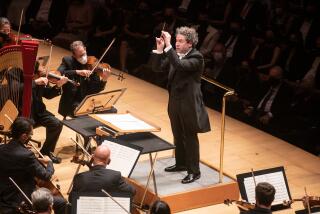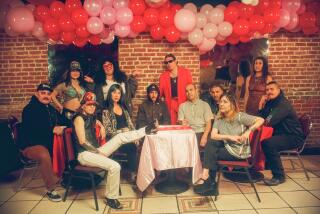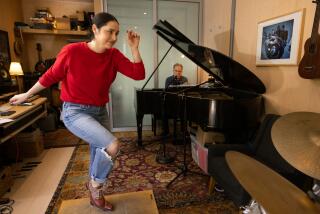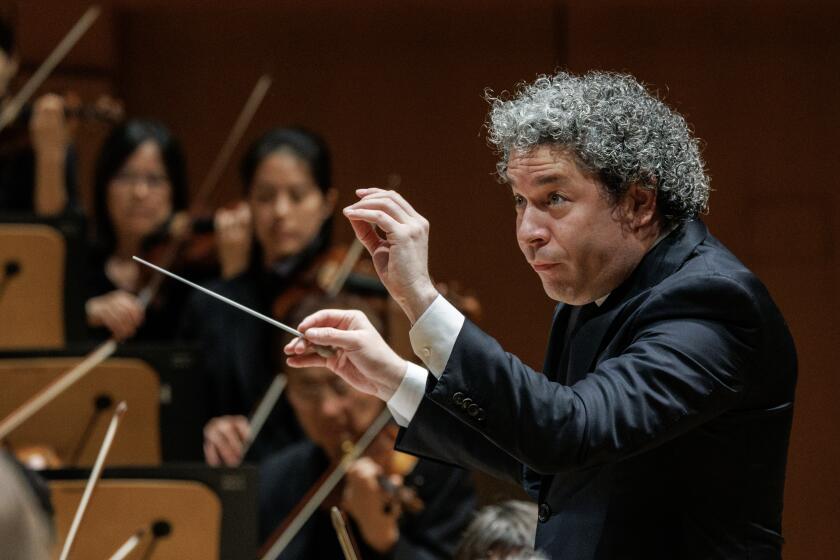Review: L.A. Phil and Herbie Hancock open the risk-taking Power to the People! festival
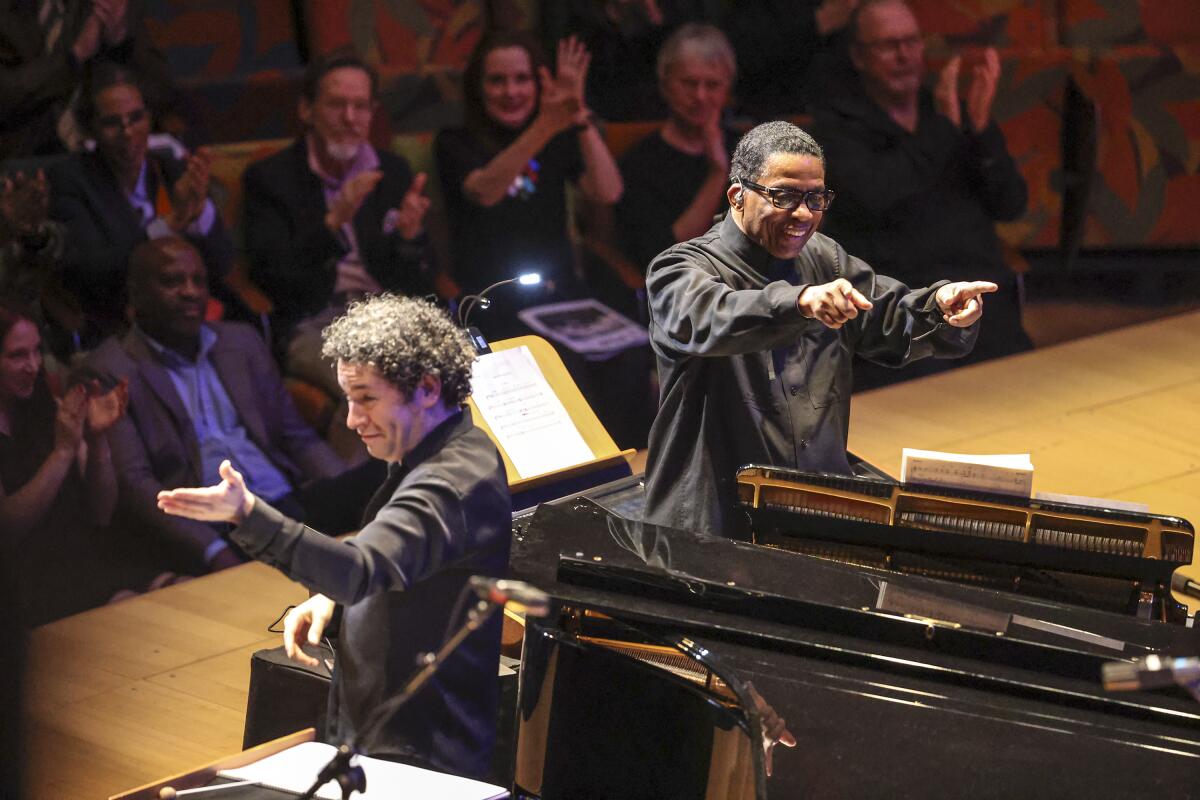
Even for the audacious Los Angeles Philharmonic, a Power to the People! festival might seem like asking for trouble.
Think of John Lennon’s 1971 song and that photo of him with raised fist. Think of the slogan as a rallying cry for Vietnam War protesters in the 1960s or the Black Panthers’ call for “All Power to the People.”
Think again.
For its opening L.A. Phil concert featuring the festival’s cocurators, jazz pianist Herbie Hancock and orchestra music and artistic director Gustavo Dudamel, Power to the People! did, indeed, invoke political activism Thursday night at Walt Disney Concert Hall. A station in the lobby let you take a selfie with a backdrop of what looked like a 1960s Bay Area antiwar demonstration. The program had a tribute to the noted radical feminist activist, philosophy professor and onetime fugitive Angela Davis, who was in the audience and who will give a talk as part of the festival on March 18.
However, next to that selfie station was a voting registration table run by the nonpartisan Power California, which works to engage young people in political activity. Most of all, change the optics, and the patriotic sentiment expressed in everything that was said and played all evening could be just as welcome at a Republican or Libertarian convention as at a Democratic or Socialist party one. Not a note, not a word proved provocative. Sure, fists were raised by some in the crowd, but those were fist bumps in lieu of handshakes, the new COVID-19 etiquette.
“Our responsibility is to work to keep the ideas of freedom alive.” “We can make the world better.” “Listen to people who don’t agree with you.”
Who’s got a problem with that?
If anything, the festival — which looks to maybe get a little more rabble-rousing once Patti Smith and the rapper Residente have their say — here bent over backward to promote political unity. A nonsubscriber concert attracted what appeared to be an admirably diverse crowd, including a lively contingent of old former hippies and young hipsters, as well as schoolchildren, political activists and jazz aficionados.
For the first half, Dudamel conducted three short, recent and compelling orchestral works by African American composers who have been active in education and social justice programs. Jessie Montgomery’s “Banner” marvelously tied Dudamel’s Ives symphony survey of the previous two weeks with the present. As if taking her permission from Ives, Montgomery deconstructs “The Star Spangled Banner,” contextualizing it with “Lift Every Voice and Sing” (often called the black national anthem) into a lavish and loving new thing.
Courtney Bryan’s “White Gleam of Our Bright Star” evokes our spacious skies with a vast cinematic cloud of orchestral chords that explodes and leaves bits and traces of fallout, iridescent sonic dust, in its wake.
“Aurora” by Wayne Shorter, jazz saxophonist and longtime colleague of Hancock (back to their days playing in Miles Davis’ famed second quintet in the 1960s), is a setting of the last stanza of Maya Angelou’s poem, “On the Pulse of Morning,” which she read at Bill Clinton’s 1993 inauguration. The score is seven minutes of soaring optimism written for Renée Fleming. This time an elated young soprano, Mikaela Bennett, sailed above the orchestra with a confidence and stellar high notes that made it sound written for her.
Hancock, the L.A. Phil’s longtime creative chairman for jazz, created orchestral versions for his quintet and the L.A. Phil of two characteristic numbers he recorded in the late 1960s and early 1970s. “Ostinato: Suite for Angela” was dedicated to Davis. A bass line repeats incessantly and obstinately for a dozen minutes. The meters are unpredictably upended, as is the instrumental landscape, as if to say ideals must be maintained but times change.
In “I Have a Dream,” written shortly after the assassination of Martin Luther King Jr., Hancock struggles to hang onto hope. Blown up to orchestral dimensions — a solo jazz flute becomes three mighty orchestral ones — the struggle for hope gets inspirationally blown up as well.
Both arrangements featured Hancock’s incisive solos (near Bartók-ian in “Ostinato”) and those of his sensational band, although they seldom dominated. Categories — jazz, symphonic music, improvisation, composition — became irrelevant. Hancock, instead, treats his orchestral scores as an ingratiating exercise in here-comes-everybody.
The last 45 minutes of what became a long concert were turned over to the quintet. Hancock moved effortlessly between his three keyboards — space-agey on his synthesizer, masterful on his Fazioli grand piano and a wild man on his portable keyboard, especially in dialogues with Terrace Martin’s sax and Lionel Loueke’s guitar. In fact, communication was clearly the key, no matter how blazing Vinnie Colaiuta’s drumming or James Genus’ electric.
Hancock introduced his set by telling the audience that the more he thinks about it, the more he believes the power is from the people. And so it was for a little while, anyway, Thursday night.
More to Read
The biggest entertainment stories
Get our big stories about Hollywood, film, television, music, arts, culture and more right in your inbox as soon as they publish.
You may occasionally receive promotional content from the Los Angeles Times.
